Hunter Stephenson's Movie Review: Observe And Report (A Contender For Best Film Of 2009). Essay: The Genius Of Jody Hill
Weekend Update: Due to the amazing bitch-session in the comments: the following article is a combination free-form essay/review on the genius, relevance, and influences of writer/director Jody Hill and his works including The Foot Fist Way, Eastbound & Down, and his latest, Observe and Report. It also deals with the growing trend of incredibly dark and conflicted American male anti-heroes in movies and TV. Oh yeah, it's also really, really, really long and I didn't see a need to begin the piece with "If you were expecting Paul Blart, get ready for a crazy rollercoaster not suitable for the kiddies." Because f*** Paul Blart. No one will remember that movie in five years, until the sequel is released and makes $200 million. My bad?
Let me preface this by saying that I now anticipate Jody Hill's films more than any other working filmmaker with the exception of Paul Thomas Anderson. And on a particularly excruciating Monday, maybe Tommy Wiseau's.
"You suck this gun like a dick and then this dick goin' cum in your mouth and blow your brains all over the street!" – Danny McBride in Observe and Report, um, protecting his legacy
Generally speaking, there are two types of people, and as it lies, two types of moviegoers: Those who go to malls without a second thought and those who go into them only on the rarest of occasions, sucking on an imaginary Klonopin, those who walk around wondering how the f*** this and they and that sign came to be, pregnant with the speeding notion that a loon might as well destroy the entire f***ing building or at least high-jack the "raffle car," peel out through the entrance doors, and drive on to a fabled body of water.
Like acne, there are troublesome, incredibly lonely and f***ed portraits of the American male popping up on the face of television and in the movies.
Against dire odds, brute creative force and perhaps a looming, larger algorithm is having its way; if the trend continues these contemporary, male Average Joe anti-heroes will soon be as varied on the pop-culture DSM as the daily selections on YouJizz. But what is most interesting is how high today's talent and creatives must jump to see their affected characters and story-lines through.
The auteurs behind such works have to be nearly as nuts, driven and unwavering as their characters, perhaps tellingly so; and they have to be smarter, sharper, more attentive and craftier than a drunk Zatoichi. What makes these '00s male characters different from years past is that their inner-violence and their worst tendencies actually manifest in front of us, their lives are stunted and doomed from the start; their likable traits float inside unhealthy globs of ugliness, so as to be vitally inseparable.
If author John Updike's Harry "Rabbit" Angstrom defined the proto-American male's trajectory for happiness with 1981's Rabbit is Rich, with Angstrom's fantasies of domestic murder and sex kept at bay by contentment, then David Chase's Tony Soprano later personified the country's trajectory for self destruction by indulging in murder, power, sex and gas guzzling to the fullest. And if The Sopranos left any doubt over the internal spiritual life of the American male when Chase's finale went black like oil, then Paul Thomas Anderson's Daniel Plainview aborted the dubious leftovers by smashing bulls*** religion into uncut capitalism with all the subtlety of two locomotives. When the latter force prevailed, Plainview proceeded to bowl his drunken soul out in a puddle of lamb's blood with no family, no love, no gods, and no friends. All of this to the twisted amusement and empathy of his creator: Anderson.
More recently, Don Draper on Matthew Weiner's Mad Men (the "bubble" example) and Walter H. White and Jesse Pinkman on Vince Gilligan's Breaking Bad are encapsulated by this existential "dark cloud of cancer and pus" that hangs over the white American male, eating at it like a Langolier while suffocating it within the long established, constantly reinforced confines of masculinity; whether in the setting of a '60s-era Manhattan or in modern day Albuquerque, New Mexico, respectively. It's within the bland, sunny, isolated expanse of Albuquerque that we find Seth Rogen's Ronnie Barnhardt in Jody Hill's amazing and important second film Observe and Report. And if any young director is at the forefront of this trend, it's Hill.
Over the last nascent year, it's been funny reading interviews with Jody Hill and his co-hort Danny McBride and reviews of their seminal comedy works, The Foot Fist Way (Best Movie of '08) and Eastbound & Down. It's not that critics "don't get it"—by now almost everyone senses that something special and exciting is happening with them—but there appears to be the need to hear Hill and McBride apologize for their characters, for their characters' intentions and actions, to make the guys emphasize that their characters are "assholes" and "bad people" on the record so that it's easier to swallow and push through an obsolete media. There are also bloggers adding to this typical, mainstream-approved wall consisting of bulls*** nods to upheld norms; a wall to lazily separate where the laughter at their Kenny Powers, Fred Simmons, and Ronnie Barnhardt begins and where the laughter with these characters and any relation to them ends...
"Therefore I will now settle into this new life. From this moment forward, Kenny Powers is just like everyone else. Normal, not special, no hopes, no dreams, pretending to be happy when he's really super sad." — Danny McBride's Kenny Powers as he observes hometown losers shooting pool and socializing
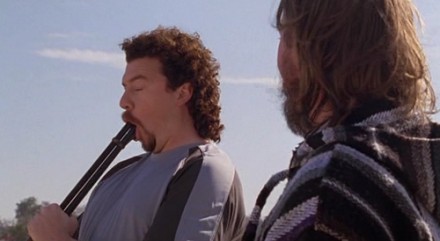
But the truth is, all of Jody Hill's characters listed above share a warped yet common bond with any teenager, 20something or 30something male attempting to escape or fight the limits set by: a hometown, a 9-to-5 job, a dead-end wife, the South, a promiscuous girlfriend, an unhappy semi-available ex, boring young married friends with babies, a prescribed pill, deadbeat, deceased or absent parents, Ric Flair-haired alpha males in charge of BMW dealerships, bad genes, and so forth. The hopes and dreams and emotion-explosions of Hill's characters are not dissimilar to the s*** that SST punk rock, invaluable hate, and so much of tomorrow's warranted, typhooning rage are made of.
Based on the spoonful, this is the stuff that leads to school shootings, assassinations, the best stand-up comedy, great art, delusion, and stardom; the funniest and meanest comments on movie blogs and the movies that make you want to run out screaming with joy because a motherf***er finally understands and broke through like gunshots. First!
In a recent video, rapper Mos Def confesses that he bought a vinyl copy of an MF Doom album even though he didn't own a record player. After quoting half the lyrics to DOOM's new album, he recalls the undeniable connection that drew him in...
"[MF Doom] rhymes as weird as I feel. I don't know if that makes any sense, know what I'm saying? Like dude, when I saw that Madvillian record, I bought it on vinyl, I didn't have a record player. I bought it just to stare at the album. [laughs] And I stared at it and I said, "I understand you. I get you...I understand. I understand."
This is analogous to how it feels when you we meet someone who likes Jody Hill's works as much as you do. You find yourself "quoting" actors' facial expressions to new-found colleagues on airplanes for chrissakes. You start to feel like how your dad must have felt when he went to see Caddyshack and witnessed Bill Murray's Carl Spackler flirt with that kid's jugular using a pitchfork, parlaying his "total consciousness." When Christopher Guest made Gumby his co-pilot in This is Spinal Tap. There's no bottom to how magical and inexplicable a countless number of these comedic moments are. It's history in the making. A dealbreaker that only the sharpest American comedy can create.
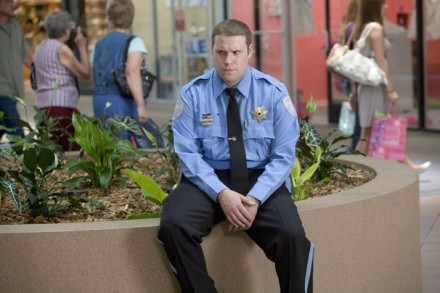 Movie Review: Observe and Report
Movie Review: Observe and Report
Ever since he discovered that the cute girl he was crushing on was born with a baby-c**k in Paul Feig's Freaks and Geeks, I've been waiting for Seth Rogen to revisit that peak as an actor. From his Butt-Head-esque chuckle to the way his eyes seemed to constantly and alarmingly seek shade from an extroverted world of boredom, Rogen's freak, Ken Miller, was the foreboding outcast on the greatest show ever about outcasts. When Freaks's fateful single season was abruptly canceled, Ken Miller was gone forever, but unlike the show's other memorable characters, many of us had a good idea for how Miller's life would pan out: bleak and oppressed. Any actions beyond the pale would probably land him in jail or dead.
Miller shared an uncanny resemblance to one of my best friends in junior high, who I lost touch with when he became an out-of-sight "freak" in high school. One of the few times I recall seeing him was in Geometry class on one of the few days that he didn't skip. He was ironically asked to leave that day because his knees were hopping up so violently from sniffing Ritalin that his desk was shaking like a faulty Space Invader. Devin Faraci at CHUD has similarly parlayed that he's unsettled by the show to this day because a character reminds him too much of an ex-girlfriend. But it's these kinds of impossibly mainlined personal connections that make people fall in love with movies and art, that make us want to keep creating, writing, and watching.
In interviews, Rogen has offered that his mall-pig, Ronnie Barnhardt, could easily be Ken Miller as an adult. And it's testament to Rogen's career-awareness and the responsibility and power he now wields over the comedy genre that he decided to explore this headspace once more. But what is even cooler is that Rogen still relates and seem to justify this character's existence to a reactionary extent that it surpasses the sadly-eclipsed reach of a director like Todd Solondz. Like Observe and Report's smart use of Patto's "The Man," Rogen is fully embodying an anthem for the disenfranchised. Barnhardt is like Ignatius J. Reilly if he preferred firearms to philosophy. He's overlooked, his eccentricities politely avoided, and he's dying to grasp his world and shape it into an ideal.
This is also the mainstream show-and-prove moment for Jody Hill as a writer/director of features, and even I was surprised by how much faith he has in audiences to ease into, eventually embrace, and then support a filmmaking style that is not a safe and cuddly homage to the '70s, but a real challenge to the subversive threshold of Martin Scorsese's Taxi Driver ('76) and The King of Comedy ('82). Those two films have been referenced in countless write-ups of Observe thus far. The film also shares a bond with other Paul Schrader stints in realism. Hill's droll take on Ronnie's thankless job in a mall, a complex for consumerism, is similar to the how jobs in an automotive plant are depicted in Blue Collar with Richard Pryor ('78). The movie's gun-lust and bug-nut, stars-and-bars nihilism involving one man's need to right a wrong (and f*** the law) recalls the pulp-fury of Rolling Thunder ('77).
The film's face-checking violence, the way Hill, McBride, and Ben Best revel in illegal expressions of freedom, and the underlying disdain for cops, authority and PC-depictions of minorities here all conjure the uncompromising '70s heyday. But it's also the irony-free aesthetic. Hill's disregard for overthought style irks many film students I've chatted with about Foot Fist. With that film, it seemed to many viewers thought it looked the way it did due to a low budget. But O&R is shot in a similarly low-rent style that makes me think of nothing so much as VHS skate videos in the '90s, such as Foundation's The Magic F. Watching a character shoplift shoes from the mall late at night to the blaring alternative-revival sounds of McLusky's "Lightsaber C***sucking Blues" ushered in that same unpretentious, once-mothballed spirit. That scene in particular almost plays like a skate video skit.
Hill is not worried if other people get it or like that scene. I'm not sure that he is obsessively dead-set on this choice of music a la Quentin Tarantino. It's innocent—a word that sounds as admittedly suspect these days as "born again"—in the same way that Michael Peña's amazing character, Dennis, loves to stammer, "I don't care! I don't care!" It's innocent like the first time skate videos hit the first skate shops in the South, where Hill hails from. And for what it's worth, Peña used to be big into skating, today's mallrat skateboarders get deservedly wacked upside the f***ing head in this film, and of course, there exists Hill's forgettable short film, Danny [McBride] Learns to Skate. Just connecting dots as I see them.
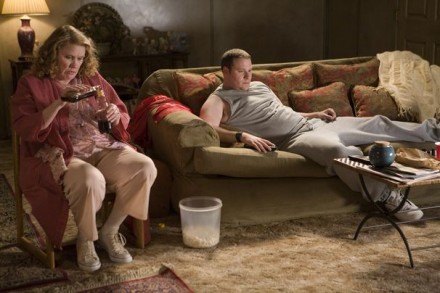
Beyond Hill's Red Apple cigarette-like placement here of his fictional snow crab leg establishment, Captain O'Lander's, as first seen in The Foot Fist Way, he sneaks in countless lived-in, definitively American details in his two films and sole TV series. It would be sad if they were overlooked by New York critics due to regionalism and class. The barren strip parking lots, the lobotomizing blankness of underfunded, forgotten office walls, the ugly way that sunlight filters through mall doors like an experiment that has peaked.
It's no wonder that Hill's characters are constantly building themselves up and that Hill never condemns them. His eye for insignificant environments, for contained and open space and the way these debatably mold his American characters into self-propelled belief systems is the domestic comedic version of what British writer/director Alan Clarke did with his country's skins, borstal youths, and soccer hooligans in Made in Britain, Scum, and The Firm.
From the cheap, pink dolphin-accented "Myrtle Beach" decor recreated in Foot Fist, to the curiously sinewy, elder sibling always sippin' a brew and offering condescending bulls*** advice in Eastbound, to the single-lamp-lit TV-room of a medicated-single-mom's home, it's there for the books. Just cropped out of the image above are the never-flattened ripples in a cheap rug that have hardened over time like mini-ramps of dysfunction. In the past, these were the details that guys only noticed when they were high and realized just how f***ed their lives were. Now they are the overlooked shavings of American comedy gold. It's a big deal.
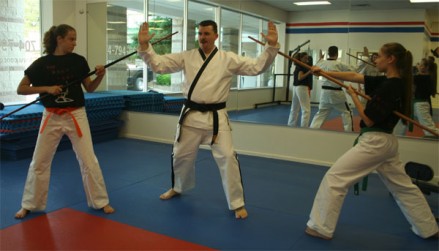
Seth Rogen definitely invests himself in the picture, but unlike with McBride's performances in Foot Fist and Eastbound, I also got the feeling I get when a great New York rap producer does a track with a great Los Angeles rapper. And indeed, the film is a collaboration between a hip, highly talented L.A. comedy star (Rogen) and a revelatory Southern director and friends. So, when I saw Danny McBride in his cameo, which made me guiltily think of Denis Leary in Judgement Night, if it was a masterpiece, and Ben Best, playing a pony-tailed cop who seduces the screen like cheap cologne and cheap NBA seats, I was immediately more drawn to those characters, to arcs drunkenly filled out in private over beers. When Hill, Best, and McBride get together, they click and then they fire on automatic. Longtime college friends all, it's going to feel more natural.
But Ronnie is also toppled and blunted by meds, so it may require more viewings to fully appreciate Rogen's performance. His character is a cold slap of pork with craziness sparking inside. Watching Rogen's face radiate schizoid is borderline bizarre. His eyes sink into black holes, onyx assholes of defeat and anger cushioned by cheeks lacking sleep for mental illness. His smile a dark swoosh of unsteady confidence. As the film progresses, Barnhardt seems to look more and more like a f***ing pig. I'm serious. Ronnie's skin and body look cartoonish like a porcelain piggy on the shelf of an authentic chopped-BBQ restaurant. The effect is almost deviously subliminal like the Cleveland Police logo.
After the press screening, the audience's blanketed silences stayed with me. The jangling of Ronnie's keys as he powers through the mall's privier and more depressing halls, as we vicariously experience the steady lows and literal, orgasmic Flash Gordon-soundtracked highs of Ronnie's bi-polar day-to-day: the pacing is what makes the film so different, at times tedious, at times jolting, ridiculous (Aziz Ansari's back/forth), celebratory, followed by steaks of real WTF genius.
You can feel 50 strangers treating the film like an intelligent puppy-that-can and then the movie bites them in the ass again and again. The theatrical audience never fully settle into the groove. However, you can at least imagine mental-boxes being checked that read "This is better than a lot of that Judd Apatow stuff, this is truer, but how will I explain this to my co-workers at the watercooler?"
Jody Hill has said that the pacing is purposeful, so as to reflect Ronnie's chemical imbalance and his in-take of cocaine, anxiety-meds, heroin, wish fulfillment, weed, and love. Moreover, the peaks-and-valleys of Ronnie now mirror the relationship many of us have with studio comedies in general, looking for huge highs never tapped against easy laughs, gag-visuals, actors back-patting, and gameshow-like electric climaxes of awful. In between five or so huge across-the-room laughs, Jody Hill seems to have colonic-ed out any and all high-testing garbage.
It might just be me, but the audience seemed to be thankful that he got to do it his way. We all know how that feels, to see a guy or girl with real vision succeed. These days, why does it feel slightly guilty to witness this type of success on screen? Why the hell are movie writers saying "PG-13 is the new R" like that means anything, and "I knew Watchmen would flop" like it's a fulfilling prophecy? At times, it seems like writers are thinking like analytical studio execs. "The business is what it is." If all works out for them, Hill, McBride, and Best will help curb and subvert that thinking.
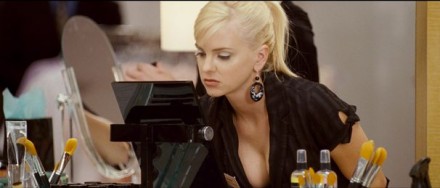
And yes, Anna Faris's Brandi is definitely a contender for best slut on film since Mary Jane Bostic's Suzie Simmons in Foot Fist. It's telling how much of a grimace Hill earns by showing both of these girls stumbling loudly in-and-out of automobiles packed with today's Ed Hardy winners. It's an instinctively nightmarish but perfectly harmless scenario that tells the modern guy that a girl is a huge whore who will wreck his life, but...maybe not? The kind of girl who is super-moisterized-hot, who hooks up with you after a long night at a bar, stays on your mind like a proud stain, and then four months later without a peep, sends you a 4 a.m. text like, "OmG, I think I just got mugged in Brooklyn by a black guy. Wot are u doing?"
Faris's performance is fearless—no other actress can do what she does, so next levs—surpassing stereotypical dumb blond-mode; she bottles that modern operator who is independent and celebrates wisely with wine glasses and coke mirrors that end up under her bed; she's the operator who curls her future-glossed lips to the hyper-ho lyrics of rapper Amanda Blank while "pushing her whip" on the way to the mall. This girl sucks so hard. There's a faux-controversy over whether Ronnie rapes her. Whatever. I can't wait to see what their kid looks like. It's going to look like America.
Observe and Report: 9.5/10Eastbound & Down: Season One: 11/10The Foot Fist Way: 11/10Hunter Stephenson can be reached at h.attila[at]gmail, followed on Twitter, and on Tumblr.
